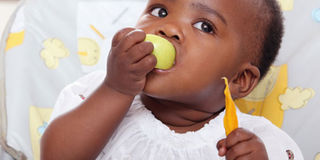Feeding babies the right way

Weaned babies must eat a regulated amount of food but in time. COURTESY PHOTO
What you need to know:
Exclusive breastfeeding has always been recommended for babies before they are six months old. However, the number of times they are supposed to feed also matters. Beatrice Nakibuuka writes tips on basic baby feeding.
The first thick breast milk is the first immunity your child gets immediately after birth. This is the reason why mothers are told to breastfeed the baby immediately after birth.
Dr Jolly Rubambarama, the chairperson Uganda National Association of Paediatric and Child Health Nurses says babies should not be given any other food except breast milk.
She adds, “A baby must feed eight times a day. It is therefore important for the mother to feed the baby whenever it wants to. This will also stimulate the milk in the mother because the more she puts the baby to feed, the more the milk.”
Working mothers can express the milk into a clean bottle. The expressed milk can be kept in a cool place and when the baby needs it, you can get warm water and dip the bottle where the milk is contain for it to gain a little temperature.
Feeding after six months
At the time of weaning, Dr Rubambarama says the number of times you are supposed to breastfeed the baby reduces to five. The mother starts to add soft foods to breastfeeding the baby.
The baby can be given plant and animal protein, carbohydrates and minerals. The food must be prepared in a hygienic place with clean fingers to reduce any risk of the child getting hygiene related illnesses.
“At this time, the baby may have developed teeth but they are not strong enough to tear or chew the food. The mother must therefore prepare the food in such a way that is soft enough for the baby to digest,” she says.
Depending on how the mother wants to train the baby, when preparing milk or juice for the baby they may choose not to put sugar. Your baby can get the sugar from the fruits contained in the fruits.
Rubambarama says, “The baby may refuse to take fluids without sugar for a few days because breast milk is a little sweet but they will adjust with time. The mother can choose to put a little sugar but not so exaggerated as excess can cause diarrhea.”
Weaned babies must eat a regulated amount of food but in time. A handful of food is enough for a baby per serving.
“When the baby is too hungry, they may refuse to eat. It is therefore important for the mother or caretaker to monitor the child so that it eats in time,” Kiguba says.
Poorly fed babies will have no appetite; lose weight, less brain development, stunted growth since they get less food nutrients and a poor immune system. Proper feeding coupled with complete immunization will protect your baby from several diseases by boasting their immune system.
Some babies develop allergies because their immune system is not fully developed but a dusty environment, smoke, animals and use of powder are likely to cause respiratory congestion to a baby.
Julian Eyotaru a nursing officer at Mwanamugimu Nutrition Unit at Mulago Hospital says many children in Uganda suffer from Vitamin A, D and Iron deficiencies which lead to poor sight, rickets and anaemia.




